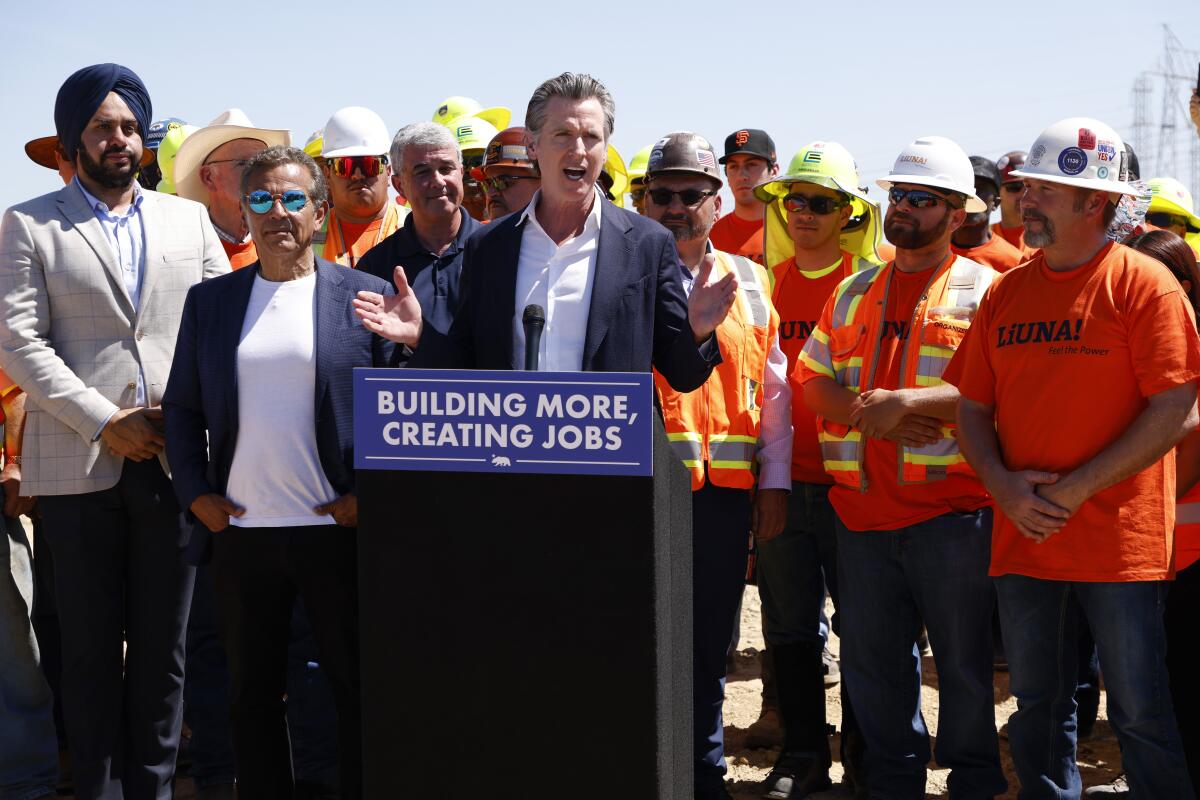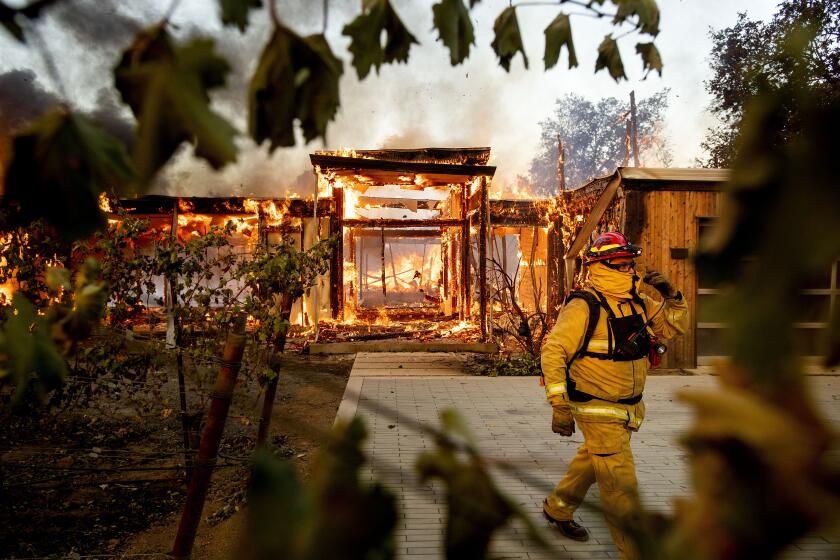Newsom’s plan to speed up construction is half-baked. California leaders can do better

- Share via
It’s hard to take Gov. Gavin Newsom’s construction streamlining proposals seriously.
Last month, the governor convened a splashy news conference on the site of a future solar farm in the Central Valley to unveil the state’s “most ambitious permitting and project review reforms in a half-century.” He said his reforms would cut project timelines by more than three years, save hundreds of millions of dollars and reduce paperwork by many thousands of pages. It sounded promising.
California absolutely needs to make it faster and cheaper to build transportation, clean energy and water infrastructure. Important projects can get bogged down in red tape and lengthy lawsuits, which wastes time and money. The Biden administration will be doling out billions of dollars for construction and climate-resiliency projects in the coming years, so the state should be looking for ways to remove unnecessary hurdles that slow approval and building to get the dollars to work sooner.
State Farm said it will stop writing new home insurance policies because of climate risks and rising costs. California lawmakers need to be more aggressive in building safer communities.
But Newsom missed the mark by putting forward 11 infrastructure bills that are a mishmash of proposals. Most are highly technical, and many are vague, duplicative or give the administration new power to fast-track projects of its choosing. He’s pushing legislators to adopt these bills as part of the budget — meaning by June 15 or shortly thereafter — leaving little time for study or meaningful public input.
That the governor would try to rush a half-baked plan into law in less than a month makes the whole package feel more like political theater than serious policymaking.
During four days of hearings on the bills last week, frustrated legislators repeatedly asked the same questions: Why is the governor trying to rush through complex legal and policy changes in a few weeks? Why allow so little time for public input or analysis? What is the urgency?
The answers from the Newsom administration were not convincing. California, officials said, will get “deprioritized” for federal funding if the state can’t do projects faster. OK, what funding is at risk? What specific projects need to move faster? The administration wouldn’t say. California, they said, is way behind on its climate goals and needs to act now. OK, what efforts will be jeopardized if lawmakers go through the normal, deliberative process to pass the bills in August or January, versus this month? Again, the administration didn’t explain.
A deal to address gas price gouging by California’s powerful oil industry contains key transparency provisions that will force an industry that operates in the shadows to finally turn over long-hidden data. Lawmakers should pass it.
When he announced his streamlining proposals, Newsom characterized them as essential to restoring trust that the government can improve peoples’ lives and respond to the threat posed by climate change. He’s right that the public wants to see more results for their taxpayer dollars.
Yet, Newsom and other leaders can’t ignore that some of those cumbersome processes were designed to also restore trust after the government allowed communities and ecosystems to be trampled in the name of progress. As California unwinds some of that red tape, state leaders need to do so in a transparent, deliberative process.
Through last week’s hearings, it was apparent that trust is still central to these debates. Advocates worry the governor’s proposals will let the state steamroll communities that oppose building a highly controversial $16-billion tunnel beneath the Sacramento-San Joaquin River Delta to transport water to Southern California. Others worry they will make it easier to bulldoze homes and businesses for freeway expansions that do nothing to fight climate change.
Some of the governor’s proposed changes build on existing efforts to streamline the 1970 California Environmental Quality Act, which requires developers to disclose the environmental effects of their projects and reduce harm they may cause. Lawmakers have previously granted select projects, including sports stadiums and corporate headquarters, a fast track that resolves CEQA lawsuits in nine months instead of a year or longer. Newsom wants to be able to grant that expedited court schedule to water, transportation, clean energy, semiconductor and microelectronics projects of his choosing.
Another proposal would let government agencies exclude internal emails and texts from the official administrative record. The Newsom administration argues this will reduce time and manpower if agencies don’t have to gather and review emails when collecting all the documentation leading up to a CEQA decision. But it’s unclear whether the proposal will save any time — internal communications are public records and any savvy CEQA lawyer will simply file a public records request to get them.
There are other proposals to expedite major construction by letting agencies contract with companies to design and build projects, rather than bidding out each step of the development process. Lawmakers have already allowed that process for select projects. Newsom wants to let state agencies use design-build contracting for eight water and transportation projects, which sounds like a reasonable request. But is it so urgent it has to bypass the usual analysis and discussion?
There is potential for worthy reforms within the governor’s proposals, if Newsom is willing to listen and negotiate. It’s easy to hold a news conference. It’s harder but far more valuable to pass good policy that makes smart, lasting change.
More to Read
A cure for the common opinion
Get thought-provoking perspectives with our weekly newsletter.
You may occasionally receive promotional content from the Los Angeles Times.











